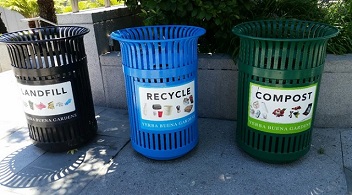NATIONAL REPORT—Given the changing global business landscape for recycling the last few years, recycling has become more complex and it has become much more difficult to save money and recycle as much as possible at the same time. Graham Rihn, CEO of RoadRunner Recycling, says one way to ensure optimal success is to employ an expert third party that offers end-to-end waste services and expertise in all aspects of recycling.
 RoadRunner Recycling, launched by Rihn in 2014, is currently working in major markets from coast to coast and is rapidly expanding its services. The Pittsburgh-based company starts with a waste audit. “We make sure you’re sending the right items to landfill, as an estimated 70 percent of a business’ tossed waste can be recycled,” Rihn says. “Our Account Management Team works to ensure you have the exact equipment and hauling schedule to save you the most on recurring costs.” Oftentimes, customers can completely remove their unsightly (and costly) containers by opting into multiple weekly pickups.
RoadRunner Recycling, launched by Rihn in 2014, is currently working in major markets from coast to coast and is rapidly expanding its services. The Pittsburgh-based company starts with a waste audit. “We make sure you’re sending the right items to landfill, as an estimated 70 percent of a business’ tossed waste can be recycled,” Rihn says. “Our Account Management Team works to ensure you have the exact equipment and hauling schedule to save you the most on recurring costs.” Oftentimes, customers can completely remove their unsightly (and costly) containers by opting into multiple weekly pickups.
Rihn says hotels are unique in that their recycling practices are often determined by brand guidelines. Hoteliers should know how they are going to be restricted by a brand prior to launching a recycling program. One common mistake hotels make, Rihn says, is to go building-wide from the get go without tackling the low hanging fruit.
“What hoteliers need to do better is section a recycling program into phases—pre-consumer implementation and post-consumer recycling,” Rihn says.
Hotels that engage directly with a solid waste management company will not get the hand holding they might otherwise get from a third party expert, Rihn says. Solid waste management companies may not have the incentive to get the most money from recyclables; in fact, Rihn says most of their profits are made taking items to the landfill.
Recycling Can be Cost Savings
Inventory areas, where products are unpacked, are prime areas for recycling. Hotels with food and beverage operations are especially good candidates because of the packing material and potential for food waste composting. RoadRunner Recycling helps customers with cardboard recycling, paper recycling, mixed recycling, waste pickup, and food composting.
“Recycling is sometimes thought to be a cost increase but it can be a cost savings,” Rihn says.
Another mistake hoteliers can make is to launch a recycling program without the proper color-coded signage. Especially back of the house, this is important. “Contamination rate can be considerably high without signage,” he says.
Clean Stream Recycling
Before China stopped taking America’s recyclables, single-stream recycling was the norm. Today, Rihn says, clean stream recycling is much more economical—taking each recyclable and finding its right niche market. That is not always easy because markets vary by region.
“Glass is a problematic material,” Rihn says. “It is uncommon for it to have an economic benefit. Cardboard is a material that makes a lot of sense to recycle. Composting can be a cost-saving strategy. You have less volume. Clean white paper has value. Mixed plastics and mixed metals are region specific.”
When RoadRunner Recycling approaches a company, it analyzes how much it is spending, how much it is recycling, and then predicts what it can do to help. “We present a proposal that includes guaranteed cost savings and a plan for a biodegradable recycling program,” Rihn says. “Our money is made on a cost reduction basis.”
Rihn says only a few percent of hotels currently have a composting program. “It just comes with establishing a clear plan with clear goals that looks to tackle the pre-consumer side of the equation first,” he says. “And, having a management group who can police the plan and having a partner who envisions the program is successful.”
Many hotels have turned to biodigesters to eliminate food waste. “You need a lot of food waste generation in order for the machines to make sense,” Rihn says. “If you do have them, emphasize proper maintenance of the machines.”
When a hotel generates 40 to 50 cubic yards of cardboard a week, there could be a cost savings with a baler. “Balers are labor intensive,” Rihn emphasizes.
Container Optimization
Getting materials into the proper waste streams can eliminate the need and cost for larger containers. “That’s a critical part of a successful program,” Rihn says. “Eighty percent of hotels have a set fee for weekly volume.”
Rihn says almost 65 percent of the time there is the ability to optimize the cost of waste management. “We have a lot of market data. We can help that hotel achieve further cost savings,” he says.
RoadRunner has worked closely with the PM Hotel Group, a leading hotel management company, to provide custom waste and recycling solutions for 22 of its hotel properties across the country. It helped the Hilton Meadowland in New Jersey cut costs on its monthly bills by 20 percent while diverting 8.7 tons of recyclable goods from the landfill each year.
When asked what advice he has for anyone thinking about launching a recycling program, Rihn says, “Keep it simple. Have a phased approach with realistic goals. Start with recycling one material and then expand your program. Have the education and process to match and build on top of it. Look for a company to help you with this process—one with services including billing, hauling, contract negotiation, and more.”
Glenn Hasek can be reached at greenlodgingnews@gmail.com.






